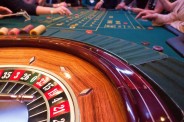
Smarter Bet Guide to Blackjack
The Psychology Behind Why We Love Games of Chance
Games of chance have always held a significant allure for people across the globe, a fascination that endures in our digital age through platforms such as online casino . This phenomenon might seem There are occasions when we here at ReadyBetGo want to bring you interesting facts about the gambling industry When something catches our eye, we will publish it for your enjoyment.
There are occasions when we here at ReadyBetGo want to bring you interesting facts about the gambling industry When something catches our eye, we will publish it for your enjoyment. 
perplexing at first glance. Why are people willing to wager their hard-earned money on uncertain outcomes? The reasons are myriad, rooted deeply in the psychological mechanisms that underpin human behaviour. To understand this better, we can delve into the complexity of how chance, risk, and reward interact with our brain.
At the core of our attraction to games of chance is the concept of the "random reward system." This refers to the excitement and anticipation associated with the unpredictability of outcomes. The occasional, unexpected rewards we receive when the dice roll in our favour trigger the release of dopamine, a powerful neurotransmitter that plays a significant role in how we experience pleasure and reinforcement learning. Consequently, even the potential for a reward, however unlikely, can become enticing. Our brains are wired to seek such thrilling experiences, driving us to engage with games of chance repeatedly.
Additionally, the illusion of control further fuels our involvement in these games. Despite the outcomes being truly random, many players believe they can influence or predict results through strategies or rituals. This cognitive bias leads them to perceive skill or influence where none exists, enhancing their engagement and belief in eventual success. Such phenomena are closely linked to what psychologists refer to as the "gambler’s fallacy," where individuals falsely presume that if something happens more frequently than normal during a given period, it will happen less frequently in the future, or vice versa.
Social factors also play a crucial role. Games of chance often serve as social conduits, facilitating interaction and camaraderie. Whether playing poker with friends or participating in a bingo night, these activities provide a platform for socialisation, shared excitement, and collective risk-taking. For some, this sense of community can be as rewarding as the games themselves, reinforcing their desire to participate.
Another psychological factor is escapism. Games of chance allow players to momentarily transcend their everyday lives and immerse themselves in a world defined by possibility and hope. In a reality often dictated by predictable routines and obligations, the unpredictability and risk inherent in these games present a refreshing break. This allure can particularly resonate with individuals seeking to momentarily escape stress or dissatisfaction in their personal or professional lives.
Furthermore, cultural influences cannot be overlooked. Historically, many societies have integrated games of chance into their traditions, perceiving them as a legitimate form of entertainment and even a rite of passage in some instances. This cultural acceptance perpetuates a normative behaviour that encourages successive generations to explore and embrace the thrill of chance.
In conclusion, understanding the psychology behind our love for games of chance reveals a complex interplay of neurological, cognitive, social, and cultural factors. While these games promise unpredictability and potential reward, they also fulfil deeper psychological needs for excitement, social connection, and escape. As our lives become increasingly digital, this intrinsic allure shows no sign of waning, suggesting that our fascination with chance is ingrained in the human psyche, fuelled by our unending quest for excitement and the unknown.
